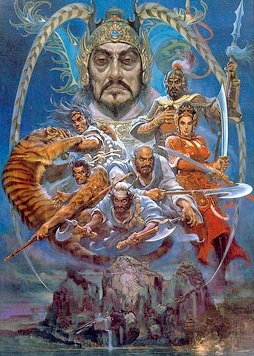Bandit Kings of Ancient China
| Bandit Kings of Ancient China | |
|---|---|

Box art for Bandit Kings of Ancient China
|
|
| Developer(s) | Koei |
| Platforms | MSX, NES, DOS, Amiga, Apple Macintosh, Sega Saturn, PlayStation |
| Release date(s) | 1989 (PC, Amiga) December 1990 (NES) 1996 (PS1, SAT) |
| Genre(s) | Turn-Based Strategy Simulation/Strategy RPG Turn-Based Tactics |
| Mode(s) | Single-player, Multiplayer (hotseat) |
Bandit Kings of Ancient China, also known as Suikoden: Tenmei no Chikai (水滸伝・天命の誓い?, "Water Margin: Oath of Destiny") in Japan, is a turn-based strategy role-playing simulation video game developed and published by Koei,[1] and released in 1989 for MS-DOS, Amiga and the Macintosh and in 1990 for the Nintendo Entertainment System.[2][3][4] In 1996, Koei issued a remake for the Japanese Sega Saturn and Sony PlayStation featuring vastly improved graphics and new arrangements of the original songs.[citation needed]
Gameplay
Based on the Great Classical Novel Water Margin, the game takes place in ancient China during the reign of Emperor Huizong of the Song Dynasty. The Bandit Kings of Ancient China—a band of ten bandits—engage in war against China's Minister of War Gao Qiu, an evil person with unlimited power. The objective of the game is to build, sustain, and command an army of troops to capture Gao Qiu before the Jurchen invasion in January 1127. Players hold certain attributes such as strength, dexterity, and wisdom. Players must also deal with other situations such as taxes, care for the troops, maintenance and replacement of weapons and equipment, forces of nature, and troop unrest and desertion.
Battlefields take place on hexagonal grids, where players move their armies across various terrain in order to strategically engage and defeat the enemy army. Troops have the capability of fighting with either melee weapons, bows and arrows, magic, or dueling swords. When a player defeats an enemy army, they have the option of recruiting, imprisoning, exiling, or executing the captured enemy troops. The attacker has 30 days to win all castles or defeat all deployed enemy commanders or be automatically defeated. The game ends in defeat for Player when the game calendar hit January 1127.[5]
The game map shows the empire composed of 48 prefectures. Any prefecture may be invaded from an adjacent territory - the only exception is the Imperial Capital Kaifeng where the player must have build up sufficient popularity to gain the attention of the emperor who will confer an Imperial decree permitting the player to march into the capital.
Reception
Reviewing the NES version of Bandit Kings of Ancient China, Nintendo Power suggested some players might find the game's pace slow compared to action oriented games, while others would enjoy the game's "depth, involvement, and attention to detail."[6] Compute! magazine praised the game as "one of the most complete and entertaining role-playing simulations available",[7] and gave it an honorable mention in the War/Strategy category of the 1991 Compute Choice Awards.[8] A reviewer in the Austin American-Statesman suggested the game's depth was overwhelming, calling the game "the richest, most complex role-playing game ever published" but saying he "had trouble figuring out ... what [he] was supposed to be doing and to whom."[9] PC Magazine reviewed the game positively, concluding that Bandit Kings of Ancient China "is an addictive game, brought alive by a mixture of computer-driven personalities, the romance of a departed culture, a large battery of options, and the unpredictability of game play."[10] Computer Gaming World gave the game three out of five stars in 1990,[11] and two stars in 1993.[12] The Amiga version received positive reviews in Amiga magazines.[13] The game was reviewed in 1994 in Dragon #211 by Jay & Dee in the "Eye of the Monitor" column. Both reviewers gave the game 3½ out of 5 stars.[14]
Computer Gaming World named Bandit Kings of Ancient China antagonist Gao Qiu as the twelfth most memorable game villain.[15]
References
- ↑ Lua error in package.lua at line 80: module 'strict' not found.
- ↑ Lua error in package.lua at line 80: module 'strict' not found.
- ↑ Lua error in package.lua at line 80: module 'strict' not found.
- ↑ Lua error in package.lua at line 80: module 'strict' not found.
- ↑ Lua error in package.lua at line 80: module 'strict' not found.
- ↑ Lua error in package.lua at line 80: module 'strict' not found.
- ↑ Lua error in package.lua at line 80: module 'strict' not found.
- ↑ Lua error in package.lua at line 80: module 'strict' not found.
- ↑ Lua error in package.lua at line 80: module 'strict' not found.
- ↑ Lua error in package.lua at line 80: module 'strict' not found.
- ↑ Lua error in package.lua at line 80: module 'strict' not found.
- ↑ Lua error in package.lua at line 80: module 'strict' not found.
- ↑ Lua error in package.lua at line 80: module 'strict' not found.
- ↑ Lua error in package.lua at line 80: module 'strict' not found.
- ↑ Lua error in package.lua at line 80: module 'strict' not found.
External links
- Bandit Kings of Ancient China at MobyGames
- Official website (Japanese)
- Articles containing Japanese-language text
- Articles with unsourced statements from February 2009
- Articles with Japanese-language external links
- 1989 video games
- 1996 video games
- Amiga games
- Video games set in the Song dynasty
- DOS games
- FM Towns games
- Koei games
- Mac OS games
- MSX2 games
- NEC PC-8801 games
- NEC PC-9801 games
- Nintendo Entertainment System games
- PlayStation (console) games
- Role-playing video games introduced in 1989
- Sharp X1 games
- Sharp X68000 games
- Sega Saturn games
- Turn-based strategy video games
- Tactical role-playing video games
- Turn-based tactics video games
- Video games based on novels
- Windows games
- Works based on Water Margin